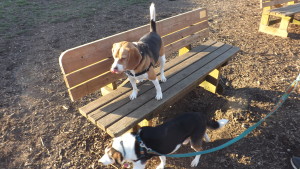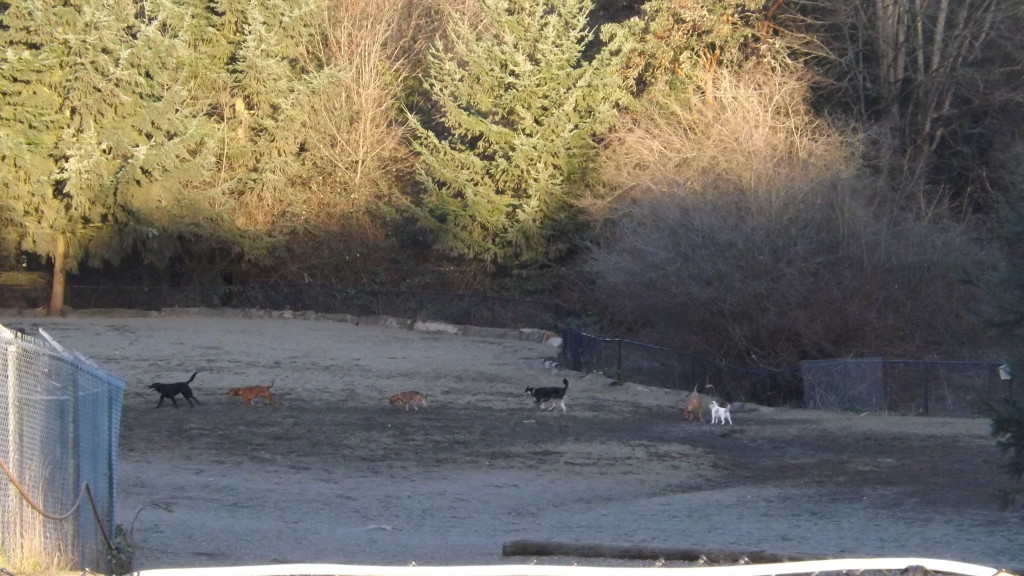Dog Park Etiquette: Recall Fail
 It’s that time again, time for a new installment on Dog Park Etiquette. (You can read the previous installments here, here, and here.) Today we are discussing what to do when recall fails. I am going to start by saying that I don’t judge any owner or dog for recall failing. The dog park is a very exciting place with a ton of stimuli that includes other dogs and people. Unless you have specifically trained your dog’s recall in this kind of environment, it’s likely to fail. And even if you have trained for something as chaotic as the dog park, recall still fails sometime. It happens. Unless your dog is attacking or harassing another dog or person, it’s just not that big of a deal. What is a big deal is if you, as an owner, decide to ignore that recall has failed and just keep calling your dog (from far away), with no result.
It’s that time again, time for a new installment on Dog Park Etiquette. (You can read the previous installments here, here, and here.) Today we are discussing what to do when recall fails. I am going to start by saying that I don’t judge any owner or dog for recall failing. The dog park is a very exciting place with a ton of stimuli that includes other dogs and people. Unless you have specifically trained your dog’s recall in this kind of environment, it’s likely to fail. And even if you have trained for something as chaotic as the dog park, recall still fails sometime. It happens. Unless your dog is attacking or harassing another dog or person, it’s just not that big of a deal. What is a big deal is if you, as an owner, decide to ignore that recall has failed and just keep calling your dog (from far away), with no result.
In my experience, recall fail most often happens when a couple of dogs just really hit it off and are playing pretty intensely. But then it’s time for one of the dogs to leave. Recall can fail for either dog. Here’s what you should do both as the owner of the dog whose recall has failed and as the owner of the dog that dog is playing with.
When the leaving dog’s recall fails. We had an experience a few months ago when Larry and another dog really got into wrestling and running around. It was great for us, Larry really needs to wrestle with bigger dogs to get his energy out. But then it was time for that other dog to leave. His owners called him and started walking away. That’s pretty standard, and what we do often, as well.
But in this case, their dog did not follow them. They just kept walking and calling occasionally, without actually checking to see if their dog was with them. They got far enough away that even though their dog could still hear them (I could barely hear them, but dogs have better hearing than people), he could not locate them. So now their dog is running around, unable to find his people, who are still walking away. This is what you should NOT do.
If you start walking away and call your dog to come with you, you need to pay attention to whether your dog actually comes or not. If your dog does not start making progress toward you, do NOT keep walking away. In fact, you probably shouldn’t even just stand where you are and call. You need to walk back to your dog (I know, I know, you took your dog to the dog park so you did not have to exercise to get your dog exercise) and get his attention. If you want to leave, it is your responsibility to make sure your dog is with you.
Now, if you are one of the other people at the park and notice that a dog’s recall has failed, probably because the distance between it and its owner is too much, you don’t have to do anything. You are not responsible for the dog. At the same time, there are things you can do to be a good “neighbor”.
In our case, when I realized that the poor dog was now confused and looking for his people, I called his name (I’d been hearing his people shout it, so I knew it) and got his attention enough to direct him toward his people. I walked him about halfway to them. (Sadly, they were still walking away and calling for their dog. I am not certain they realized that their dog had lost them and needed help finding them.)
Another thing you can do, if you are the owner of the dog the dog who’s recall has failed is playing with, call your dog over to you. Stop the play, stop the stimulus so that the other dog can notice that his people are calling him.
The other thing I try to pay attention to is the mobility of the dog’s owner. Westcrest dog park is less than 2 miles from a senior living apartment complex, and we have noticed a number of older people who take their dogs to the park so that the dogs can get more exercise than their owner is capable of giving them otherwise.
We had one day where Howie and another old man dog became very fascinated with each other. When it was time for the other old man dog to leave, he did not notice his person calling him. His person had mobility issues, but started moving toward us to get his dog. Since Howie was on a leash, I started moving both dogs toward the other’s person. Yes, he would have come to get his dog, but let’s be honest. It was a whole lot easier for me to take his dog to him than it would have been for him to come get his dog.
Again, you don’t have to do either of those things. You are not responsible for the other dog, but etiquette is not about what we have to do. It is about what we should do to make sure an experience is as good as it can be for everyone.
When recall fails for the dog who is staying. Sometimes the problem is just the opposite. The dog who is leaving is perfectly happy to go, and so is the dog he is playing with. (Our dogs are much more likely to be the “problem” dogs in this scenario.) The owner of the dog who is staying calls their dog, tells them to stay, to let the other dog leave, whatever, and their dog listens not one little bit. They can still play chase on the way out of the park. (I will note that it’s not always play with the other dog that causes a dog to follow someone else out. June will happily follow people with treats, regardless of their dog.)
Once again, it is your responsibility as the owner of the dog who is not coming when called to go get your dog. You can’t stay where you are or walk away and just keep calling your dog. Calling your dog has failed. You have to go get your dog. And yes, sometimes that might mean you need to pick up the pace a bit- actually jog (or at least walk fast) to catch up to your dog who is following someone else out of the park.
As the person trying to leave in this case, once again, you do not have to do anything. You don’t have a responsibility beyond not letting the other person’s dog out of the gate (if there is a gate- our biggest embarrassment is when June followed a family out of a park where there wasn’t a gate and hopped right in their car). However, like before, there are things you can do to make the situation easier on everyone involved. And, it’s really simple.
Stop moving. That’s right, instead of continuing to move for the exit, away from the owner of the other dog, stop for a moment. Give the other owner a chance to catch up to you and get their dog (before it winds up in your backseat). Waiting for a minute for the other owner to come get their dog is not going to cause you any major hardships, so just be patient and let them get their dog.
Now, if the other owner shows no inclination of actually coming and getting their dog (we saw this this last weekend- our dogs were not involved), and just keeps calling them from where they are, or tries walking away and their dog keeps ignoring them, you are free to make your way out of the park.
Just use common sense and practice courtesy. There will come a time at the dog park when your dog’s recall will fail. It happens. It is not a big deal, but how you react to it is. Use common sense. Take responsibility and act if it is your dog. If it is not your dog, show some understanding and compassion (for the dog, if not the owner) and give them a little help. It makes the dog park experience better for all of us.

